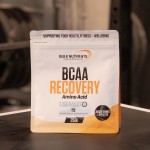BCAAs: What Are They and How Can They Help My Training?

So, what are BCAAs?
Branched Chain Amino Acids (BCAAs) are commonly referred to as the building blocks of the body. This is because they make up a third of human muscle mass and are essential to stimulate further muscle growth.
BCAAs refers to three essential amino acids: L-Leucine, isoleucine, and valine which positively influence the muscles by encouraging protein synthesis.
BCAAs can be found in any food containing protein, in fact, BCAAs are naturally found in high levels within our protein powders!
However, there is a difference between supplementing with BCAAs specifically during exercise, rather than just relying on what you get from the foods you eat.
Specifically supplementing with BCAAS (during a gym session or sporting event) can be of real benefit to the muscles you’re using for recovery and muscle development.

How can BCAAs help me?
Studies have uncovered many benefits to BCAA supplementation, particularly its exercise-related abilities.
BCAAs work to build muscle and prevent muscle and mental fatigue during strenuous exercise, which comes as a massive plus to those smashing it out in the gym.
Heard of DOMS (delayed onset muscle soreness)? Or have you experienced DOMS before? BCAAs are another way you can help reduce muscle soreness in the days following your workout.
Research has found BCAAs to be useful in reducing DOMS and muscle damage induced by exercise. One study even found that BCAA supplementation prior to squat exercise decreased DOMS within a few days after exercise.
BCAAs' Muscle Building Properties
BCAAs have some amazing muscle building abilities, as they have an anabolic effect on protein metabolism by increasing the rate of protein synthesis and decreasing the rate of protein degradation.
BCAAs muscle-building capabilities come primarily from the main amino acid L-Leucine. Research shows L-Leucine, in particular, can promote muscle growth by inducing muscle protein synthesis.
During exhaustive aerobic exercise, there is a serum decline in BCAAs. This causes a decrease in L-Leucine levels and a reduction in glycogen stores, which causes fatigue to set in. So, supplementing with BCAAs before or during endurance exercise can decrease the rate of protein degradation, improve mental and physical performance and could also have a sparing effect on muscle glycogen degradation and depletion of muscle glycogen stores.
Plus, for people with low dietary protein intake, BCAA supplementation can especially promote muscle protein synthesis and increase muscle growth over time.
One study found that in trained men given 14g BCAAs daily for eight weeks alongside a routine weightlifting plan, the consumption of BCAAs promoted fat loss (2.2% body fat) and promoted lean mass accrual (4.2kg) to a greater extent than 28g of whey protein (2.1kg lean mass and 1.2% body fat) and 28g carbohydrate (1.4kg lean mass and 0.6% body fat).

Anti-fatigue Capabilities of BCAAs
BCAAs ability to reduce glycogen depletion rates means that those supplementing during exercise are less likely to endure extreme fatigue. Yes, that’s what we mean when we say train harder for longer.
A decrease in fatigue (mental fatigue when measured after the workout) results when BCAA supplementation is taken during exercise at a dose above 10g or so.
Ability to train harder for longer as it delivers aminos to the muscles that are depleted as it occurs.
Plus, the improved recovery time and reduced DOMS means that fatigue and soreness after a workout is lessened so you can do more workouts during the week
An increase in time to exhaustion appears to exist in prolonged endurance exercise, but most studies believe this to be more so the case for untrained or lightly trained individuals.
A study looking at fatigue in elite male offshore racers found that those taking a supplement with high levels of BCAAs reported a reduction in physical and mental fatigue.
Another study found that BCAAs help to preserve cognition in the later stages of exercise and can reduce neural fatigue.
Using BCAAs intra-workout can help prevent fatigue.
When to take BCAAs
Due to their ability to prevent fatigue and muscle recovery, BCAAs are a perfect intra-workout supplement.
Or another way to get extra protein in when you don’t currently have a high protein diet is to sip on them during the day.

Bulk Nutrients' BCAA supplements
We stock a range of BCAA supplements, as we believe they’re an essential part of any fitness enthusiasts stack!
This is our all in one intra-workout BCAA supplement, so you can train harder and recover faster. Each serve delivers a clinical serve of BCAAs along with added electrolytes to promote hydration during intense exercise. It also contains a high dose of Citrulline Malate, which has been shown to reduce muscle soreness and increase workout performance and capacity. Plus, it enhances the BCAAs so you can reap more benefits from both compounds.
It comes in six great flavours - Apple & Blackcurrant, Lemonade (which is HASTA tested for athletes), Passionfruit, Watermelon, Wild Berry and for a limited time only, Peach Iced Tea!
A popular choice for those wanting to add pure BCAAs in with other supplements or choosing to flavour it themselves.
Be aware, they taste bitter as a raw powder, but unflavoured Branch Chain Amino Acids can also be flavoured using our flavouring pouches.
We also sell the prime amino acid for protein synthesis, L-Leucine on its own.

Ellie’s an absolute copywriting boss from Hobart, Tasmania!
She's an amateur powerlifter who's crushed it in several competitions, and she's got all the keto knowledge to keep her fuelled up for her workouts.
One thing you'll always find in Ellie's pantry is a jar of peanut butter - she's obsessed.
More about Ellie HearnReferences:
- Blomstrand, E., Eliasson, J., Karlsson, H. and Köhnke, R., 2006. Branched-Chain Amino Acids Activate Key Enzymes in Protein Synthesis after Physical Exercise. The Journal of Nutrition, [online] 136(1), pp.269S-273S. Available at: Branched-Chain Amino Acids Activate Key Enzymes in Protein Synthesis after Physical Exercise.
- Mero, A., 1999. Leucine Supplementation and Intensive Training. Sports Medicine, [online] 27(6), pp.347-358. Available at: Leucine Supplementation and Intensive Training.
- Portier, H., Chatard, J., Filaire, E., Jaunet-Devienne, M., Robert, A. and Guezennec, C., 2008. Effects of branched-chain amino acids supplementation on physiological and psychological performance during an offshore sailing race. European Journal of Applied Physiology, [online] 104(5), pp.787-794. Available at: Effects of branched-chain amino acids supplementation on physiological and psychological performance during an offshore sailing race.
- Ra, S., Miyazaki, T., Ishikura, K., Nagayama, H., Komine, S., Nakata, Y., Maeda, S., Matsuzaki, Y. and Ohmori, H., 2013. Combined effect of branched-chain amino acids and taurine supplementation on delayed onset muscle soreness and muscle damage in high-intensity eccentric exercise. Journal of the International Society of Sports Nutrition, [online] 10(1), p.51. Available at: Combined effect of branched-chain amino acids and taurine supplementation on delayed onset muscle soreness and muscle damage in high-intensity eccentric exercise.
- Shimomura, Y., Inaguma, A., Watanabe, S., Yamamoto, Y., Muramatsu, Y., Bajotto, G., Sato, J., Shimomura, N., Kobayashi, H. and Mawatari, K., 2010. Branched-Chain Amino Acid Supplementation Before Squat Exercise and Delayed-Onset Muscle Soreness. International Journal of Sport Nutrition and Exercise Metabolism, [online] 20(3), pp.236-244. Available at: Branched-Chain Amino Acid Supplementation Before Squat Exercise and Delayed-Onset Muscle Soreness [pdf].
- Stoppani, J., Scheett, T., Pena, J., Rudolph, C. and Charlebois, D., 2009. Consuming a supplement containing branched-chain amino acids during a resistance-training program increases lean mass, muscle strength and fat loss. Journal of the International Society of Sports Nutrition, [online] 6(S1). Available at: Consuming a supplement containing branched-chain amino acids during a resistance-training program increases lean mass, muscle strength and fat loss.
- Wiśnik, P., Chmura, J., Ziemba, A., Mikulski, T. and Nazar, K., 2011. The effect of branched chain amino acids on psychomotor performance during treadmill exercise of changing intensity simulating a soccer game. Applied Physiology, Nutrition, and Metabolism, [online] 36(6), pp.856-862. Available at: The effect of branched chain amino acids on psychomotor performance during treadmill exercise of changing intensity simulating a soccer game.































